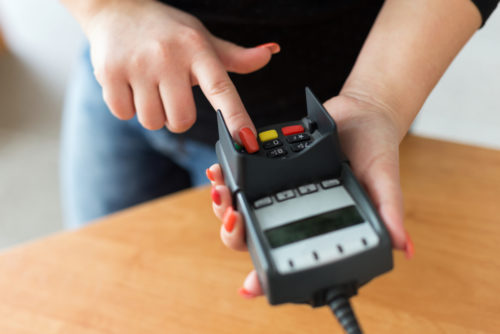Credit cards with EMV chips have become widespread throughout the US in recent years. Other parts of the world have been using it for much longer; we eventually adopted the EMV chip for the added security. However, European and Asian countries typically require a PIN after every credit card transaction. That’s the not the case in the US— we usually just require a signature.
As a side note, “PIN number” is a redundant phrase. PIN stands for Personal Identification Number, so there’s no need to add an extra “number” afterwards.
Do You Need a PIN for a Credit Card?
Most likely, no; Americans don’t need PINs to pay with credit card. If you are frequently traveling internationally, you might want to look into some alternatives. However, machines in the US will just prompt you for a signature.
You might not even need to provide that much. Many credit cards will not require a signature for shop purchases under $25 or grocery store purchases under $50. That’s why you rarely have to sign for anything in convenience stores, as the total amount is usually below this threshold. Additionally, many credit card networks plan to do away with the signature altogether.
However, if you’re looking to get a cash advance off of your credit card from an ATM, you will need a PIN. Read below to see how.
PIN for Debit vs. Credit
If you have a debit card, you’ll already be familiar with what a PIN is and how to use one. However, if you run a debit card as credit, you won’t be asked for a PIN. Unfortunately, it doesn’t work the other way around. You can’t run a credit card as debit.
Debit cards draw from your existing balance. It’s money that you already have; it’s just not on you at the moment. Credit cards are essentially “borrowed” money, so it is treated differently. There are pros and cons to using each, but ultimately it will depend on the situation.
Credit cards don’t use PINs in the US for a multitude of reasons: card issuers are worried that it will make them less competitive, the hassle, and the cost, just to name a few. However, given that some consumers do need a PIN for their credit card, how do you go about acquiring one?
Getting a Credit Card PIN
Most of the US has a card with EMV chip technology by now. If you don’t have one yet, contact your bank ask ask. Some credit card issuers are not releasing cards with chip technology, and others have just gotten around to it.
If you have a card with an EMV chip but just need a PIN, call your bank’s customer support and check their website. You might be able to request a PIN under your account information, but if all else fails, give them a call.
They will send you a PIN in the mail. This might take a couple days, so be sure to request one a few days before you will need it.
Having a PIN attached to your credit card is an extra security measure that you might want to consider if you travel internationally frequently, often get cash advances on ATMs, or just lose your card a lot. A PIN will prevent anyone who finds it from using your credit card. However, a PIN is not necessary for every consumer in the US right now.
Image Source: https://depositphotos.com/





